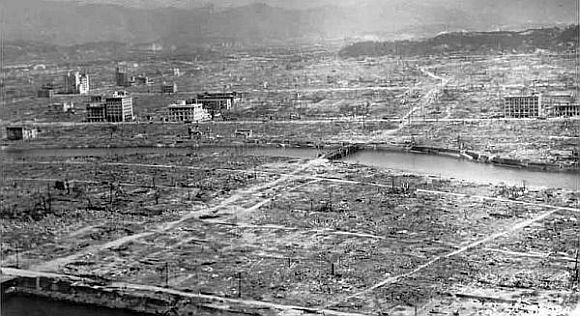
“Any religion worth talking about is essentially political and any politics worth talking about has some vision of transcendence and of the mystery of human life,” said the Jesuit priest, antiwar activist and poet, Daniel Berrigan, at the time of the trial of the Plowshares Eight in 1981. Berrigan died on Saturday at the age of 94.
In 2006, noting that the “short fuse of the American left is typical of the highs and lows of American emotional life,” Berrigan said: “It is very rare to sustain a movement in recognizable form without a spiritual base.”
This absence of a spiritual base, expressed through commonly held values, can be seen as one of the defining characteristics of the politics of dissent in the post 9/11 era.
The commonalities around which shifting forms of unity have emerged and dissolved have invariably come in the form of shared outrage and hatred.
We decide who we stand with by flagging what we stand against:
- American Empire
- Western Imperialism
- Zionism
- Capitalism
- Neoliberalism
- Militarism
- Corporate power
- Globalization
- National security state
- Mass surveillance
- Mass incarceration
- Police brutality
- Racism
- Xenophobia
- Islamophobia
- Homophobia
- Sexism
But the affirmative common ground gets far less clearly defined if articulated at all.
Where humanitarianism and internationalism once prevailed, anti-interventionism has become one of the most frequently voiced principles.
Opposition to America imposing its values on the world, has come to mean the plight of people who lives and basic rights are in peril can often be ignored.
It seems we have less responsibility to make this a better world than to merely claim we have done it little harm.
It is as though the measure of a life well lived be that it is of no consequence as we each swear to a political Hippocratic oath.
Indeed there are those who now view the concept of human rights as so tainted that it functions as nothing more than a justification for war.
Out of this emerges for some a libertarian insularity where the least harm each of us might do is to mind our own business, and for others an isolationist social-justice realism which says, take care of the folks at home instead of trying to fix the world.
In a political context where it’s much safer to assume an adversarial posture and stand up against our nameable enemies, what’s much harder is to move beyond divisions and to focus instead on the greatest deficits in our world: a lack of love and kindness and the absence of a widely embraced vision of a better future.
It’s much easier to unify around what we stand against.
Bring love and kindness into the equation and most of the boundaries we use to define our political identities become less secure; our opponents cannot so easily be made other.
Consider, for instance, the issue of Palestine.
If viewed through a dispassionate political lens, we can talk about the Israeli-Palestinian conflict in terms of self-determination, social justice, and anti-colonialism and yet as a human concern, empathizing with Palestinians being bombed in Gaza by Israelis is surely no different than responding with empathy to atrocities being carried out in Aleppo.
For those on the ground, the outcome of the bombing is no different and yet the fact that the former provokes global outcries while the later is met largely with global indifference speaks to something that few observers will dare state: their hatred for the perpetrators of the violence is more deeply rooted than they sympathy for the victims.
* * *
To recognize the political and social influence of Daniel Berrigan did not require that you shared his pacifism or his religious beliefs and yet his striking integrity derived from the fact that he was a living expression of religion and politics made indivisible.
In 2006, as Berrigan turned 85, he was interviewed by Chris Hedges for The Nation:
All empires, Berrigan cautions, rise and fall. It is the religious and moral values of compassion, simplicity and justice that endure and alone demand fealty. The current decline of American power is part of the cycle of human existence, although he says ruefully, “the tragedy across the globe is that we are pulling down so many others. We are not falling gracefully. Many, many people are paying with their lives for this.”
“The fall of the towers [on 9/11] was symbolic as well as actual,” he adds. “We are bringing ourselves down by a willful blindness that is astonishing.”
Berrigan argues that those who seek a just society, who seek to defy war and violence, who decry the assault of globalization and degradation of the environment, who care about the plight of the poor, should stop worrying about the practical, short-term effects of their resistance.
“The good is to be done because it is good, not because it goes somewhere,” he says. “I believe if it is done in that spirit it will go somewhere, but I don’t know where. I don’t think the Bible grants us to know where goodness goes, what direction, what force. I have never been seriously interested in the outcome. I was interested in trying to do it humanly and carefully and nonviolently and let it go.”
“We have not lost everything because we lost today,” he adds.
A resistance movement, Berrigan says, cannot survive without the spiritual core pounded into him by [Thomas] Merton. He is sustained, he said, by the Eucharist, his faith and his religious community.
“The reason we are celebrating forty years of Catonsville and we are still at it, those of us who are still living — the reason people went through all this and came out on their feet — was due to a spiritual discipline that went on for months before these actions took place,” he says. “We went into situations in court and in prison and in the underground that could easily have destroyed us and that did destroy others who did not have our preparation.”
During an interview in 1981, Berrigan was asked how he came to the “deep waters” — the spiritual perspective — that enabled his activism.
It’s a question of coming from somewhere, having some tradition available to you — some symbols, some worship, some common life… coming from somewhere better than America, because I don’t think America is anywhere to come from.
In a world where it has become so easy to denounce America and point to the extensive harm this nation has done as its imperial power ungracefully unwinds, the politics of outrage nevertheless evokes little sense of somewhere better than America.
The collapse of empire is nothing to celebrate if we lack a vision of something better to take its place.





